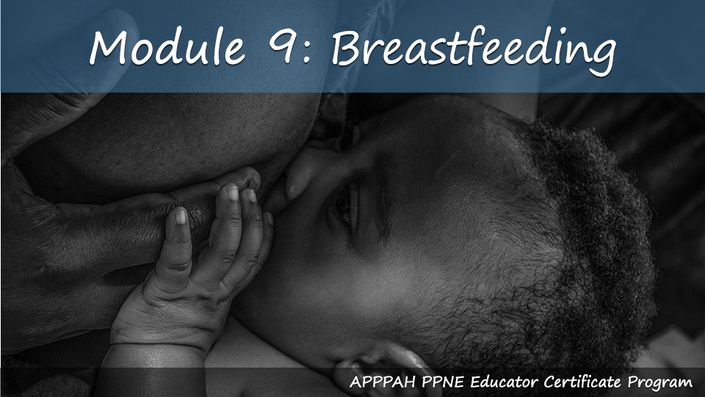
Module 9: Breastfeeding
Self Attachment & Breastfeeding

Module 9: Self Attachment & Breastfeeding
Birth, bonding, breastfeeding, and attachment all affect babies and their relationships with their caregivers, as well as their caregivers with them. This module offers a wealth of information about birth and breastfeeding from a pre and perinatal psychology perspectives. Students will learn about skin-to-skin practices, the breast crawl and the importance of self attachment.
Learning Objectives:
- Identify the importance of Skin-to-Skin, especially the health outcomes for mother and baby, its impact on breastfeeding and the mother-baby bond.
- Identify the 9 stages that babies go through during the first hour after birth.
- Understand the importance of the Breast Crawl and be able to educate others.
- Educate listeners on breastfeeding from a pre and perinatal psychology perspective.
- Define bonding and attachment and name their potential positive psychological and psychosocial outcomes, especially their influences on nervous system functioning in newborns.
- Name major influences in the field and be able to refer listeners to resources for further study or support.
- Define and educate about prenatal and birth shock and trauma, especially how they impact the body and the psyche.
- Describe what health and healing from prenatal and birth trauma looks and feels like.
- Name the characteristics of non-traumatized newborns.
- Name shock affects of newborns.
- Name the skills that practitioners use to renegotiate prenatal or birth difficulties.
- Describe the various baby cries and the importance of emotional expression in babies.
- Understand the aspects of betrayal connected to our treatment of babies and how to support a sense of trust, especially in an educational setting.
- Name the seven steps in healing betrayal.
- Name and describe the pre and perinatal imprinting process.
- Discuss the role of memory during the pre and perinatal period.
- Educate about birth from a baby's perspective.
- Describe therapeutic approaches for families, moms, dads, and babies who have experienced prenatal and birth trauma, and have resources for referrals.
Course Curriculum
Overview
Available in
days
days
after you enroll
Module 9 Content
Available in
days
days
after you enroll
-
StartDelivery Self Attachment (5:59)
-
StartThe Baby Friendly Initiative
-
StartVideo: Kangaroo Care I Dr. Nils Bergman (25:42)
-
StartVideo: Kangaroo Care II Dr. Nils Bergman (54:16)
-
StartEarly contact versus separation: Effects on mother–infant interaction one year later
-
StartBeing with newborns
-
StartCaregiver role in birth & newborn self attachment needs
-
StartThe sacred hour: Uninterrupted skin-to-skin contact immediately after birth.
-
StartThe neuroscience of birth – and the case for Zero Separation by Nils Bergman
-
StartZERO SEPARATION of mother and newborn: the science behind the concept
-
StartHow Birth Trauma Affects Breastfeeding and How Breastfeeding can Help Birth Trauma (video) (8:31)
-
StartModule 9 Comprehension Quiz
-
StartModule 9 Essay
-
StartBonus: Supported Attachment with Mary Jackson
